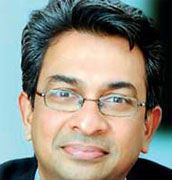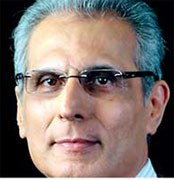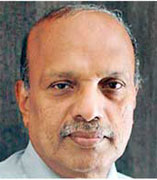IT graduates essential for vibrant software industry - MD, Google
India
CCC Econ. Summit 2016:
By Lalin Fernandopulle
Sri Lanka should gear itself to face the next phase of the
Information Technology transformation which will change the landscape of
every sector, stressed a speaker at the Sri Lanka Economic Summit held
from August 2-3 in Colombo.

Dr. Mohd Gazali Abas |

Rajan Anandan |

Ashroff Omar |

Ranjith Gunatilleke |
Managing Director, Google India, Rajan Anandan said the second phase
of the IT transformation will be more interesting than what took place
during the past 20 years. The internet will have an impact on every
sector. Most of the type of work that is done today will change in the
next 10 years. In 15 years time, computers will be smarter than people.
“Sri Lanka has enough talent but it needs the right skills. Uber,
Alibaba and Google have transformed the way of doing business. Sri
Lankan companies need to leverage on human capital. India has a US$ 100
billion IT industry with TCS, an IT giant employing 300,000 people.
India expects the industry to be a US$ 300 billion industry in the next
10 years,” Anandan said.
Sri Lanka’s IT industry work force is around 80,000 and the export
revenue is still below US$ 1 billion.
Anandan said the Moratuwa University plays a great role in putting
out IT graduates whose talents should be harnessed to build a vibrant
software industry in the country. Sri Lanka does not have a single data
science program without which there is no future. It has opportunities
and if it gets it right, the country will reach significant growth in
the IT industry. “There are 3.3 billion internet users in the world
today and by 2020 five billion people will be on the internet. One could
imagine the transformation that would take place as a result of IT,” the
Google India, MD said.
Managing Director, Sanken Construction, Ranjith Gunatilleke said he
is confused as to how he could link IT with the construction industry
which is currently in dire straits due to a severe dearth of semi and
unskilled labour in the country.
“Prime Minister Ranil Wickremesinghe has pledged to create one
million jobs soon but the question is how this could be achieved when
the construction industry is unable to get workers who are hired by
other sectors which offer lucrative packages,” Gunatilleke said.
He said the industry has to hunt for people. Manpower has been a huge
problem for the construction industry. We have enormous talent but it
cannot be harnessed for the industry. Many do not like to join the
construction industry due to the negative perception in society.
Brandix Lanka CEO Ashroff Omar said; “Our current problem is with
education. Malaysia has 95 percent of its student population undergoing
tertiary education. The three-wheeler sector is the largest employer for
school drop-outs in Sri Lanka. We have need to come up with a program
and implement it in small steps to change this trend and harness talents
for productive use, if not we would be speaking about the same problem
at the next economic summit as well.
Presenting the Malaysian success story, Deputy Secretary-General
(Operations), Ministry of Human Resources, Malaysia Dr. Mohd Gazali Abas
said Malaysia invests 30 percent of its budget on education and added
that 95 percent of the school leavers undergo vocational training before
taking up employment. The government recognizes them by awarding
certificates.
“Malaysia has a Human Resource Development Fund where all eligible
companies contribute one percent of the revenue to develop human
resource capital. Skills development in the private and public sector is
given precedence to ensure productivity through right talent,” Dr. Abas
said.
He said around 56 percent of the women are in the labour market and
the unemployment rate is less than four percent in Malaysia. Sri Lanka
has the talent, but it is not big enough to make an impact.
Its resistance to foreign talent and a less competitive environment
for international investors are challenges the country should look into.
However, Dr. Abas said Sri Lanka has lot of potential for tourism due to
its strategic location. Malaysia needs to grow by 5.5 percent in the
next five years to get over the middle income trap. Malaysia recorded
6.6 percent GDP growth during the past 40 years. |

